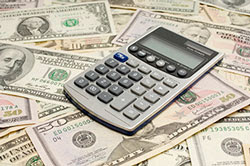Simple question, but there’s no simple answer. Wachovia Capital Markets bond analysts Bishop Cheen and Davis Hebert have been running the numbers for a series of scenarios to figure out the recovery value of Clear Channel’s debt. They call it “Debt Bingo” because the matrix of scenarios could rival the number of squares on a classic Bingo card.
The sort answer, after considering their 16 possible outcomes, is that the analysts figure Clear Channel debt could be valued at about 57 cents on the dollar. Under nearly all of their scenarios (14 out of 16), there is no residual value to the company for unsecured debt, let alone equity holders. Only if the company is able to reduce its secured debt and produce more media cash flow than currently seems likely (say, $1.6 billion instead of $1.3 billion) will the picture improve by the end of 2009.
“All roads go through secured debt. If the company can reduce secured debt, post higher earnings and be valued at more normalized 10x EBITDA we believe there would be about $1.5 billion of residual value to cover about $5.3 billion of other debt below the 10.75% cash-pay LBO notes. That implies a big discount for the unsecured debt (including the 10.75s) in a restructuring,” the Wachovia analysts wrote.
As our readers know, Clear Channel is currently trying to refinance an intercompany note owed to Clear Channel Communications by its 89% owned subsidiary Clear Channel Outdoor. That would reduce the senior debt on the parent company’s books and the Wachovia analysts noted that the trading price for Clear Channel’s benchmark Term Loan B moved up after the refi plan was announced.
Cheen and Hebert also note that Clear Channel could also reduce its senior debt by selling some more assets. But, they note, “to whom?” The M&A market for broadcast stations has been almost nonexistent for more than a year and Clear Channel failed to sell all of the radio stations it had hoped to before the market collapsed. However, the analysts say they “can’t ignore the one obvious buyer” – not for radio stations, but for outdoor assets. Closely held J.C. Decaux, based in France, has repeatedly said it would be interested in buying all or parts of Clear Channel Outdoor.
Meanwhile, as we have noted previously, the private equity funds who own most of the equity of CC Media Holdings, Clear Channel’s parent company, are playing for time. “We think the CCU LBO sponsors will do just about anything short of pumping in a lot of new cash into CCU to keep the company out of default, and, in turn, give it time for the sponsors’ $3 billion of initial equity to be salvaged someday. If that means selling CCO’s assets at deep discounts — weak or strong, whatever might fetch the best bid the way we see it— then so be it. It is a pretty simple, motivated-seller scenario, in our opinion. Aside from outdoor, there are other noncore assets that could be sold to raise capital. We think with a covenant step-down to 9.25x in 2010, management would like as much cushion as possible. Even if CCU stays compliant in 2009 with its secured debt covenant, a weak or slow-to-recover advertising market could push CCU near default in 2010. But, as noted earlier, a recovering ad media economy in 2010 could allow CCU to better manage its balance sheet and its secured creditors with lots of options heretofore shut down, such as M&A,” the analysts wrote.
RBR/TVBR observation: Someone will eventually be able to shout “Bingo!” Will it be Bain Capital and Thomas H. Lee Partners, who control most of the equity, or the vulture funds who have bought up most of the senior debt and are hoping to see the company go into default so they can claim its assets on the cheap?
Have a comment, post it below or try our new forum the RBR/TVBR Community Forum Boards




